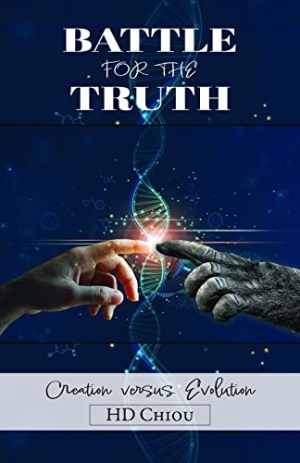Battle for the Truth
Creation versus Evolution
The religious text Battle for the Truth makes familiar arguments about God-sized holes in scientific theories.
Taking a familiar religious approach, H. D. Chiou’s book Battle for the Truth contrasts the theory of evolution with suggestions of intelligent design.
Arguing that it is impossible to ignore God’s hand in the intricate mechanisms behind life on Earth, the book reenvisions scientific concepts with divinity in mind. Its subjects include the golden ratio, the precision needed to reside in the life-fostering planetary Goldilocks Zone, and the irreducible complexity of the human body. It also tackles aspects of Charles Darwin’s theory of evolution to argue that modern science reflects biases, and it juxtaposes biblical verses to scientific sources.
But this work is delayed by the book’s opening comparisons between religions, with Christianity compared to other spiritual traditions, including Daoism and the logos of Heraclitus. Such work is an awkward fit in a book that is most devoted to critiquing scientific theories to redefine the relationship between modern science and religion. Scientific discoveries by Nicolaus Copernicus, Isaac Newton, and Albert Einstein are repackaged; some are made to suggest the possibility of an intelligent designer while others are said to have holes in their theories without that possibility. However, the book’s sole focus on Western science and discoveries in the distant past limits its scope and persuasiveness.
The book repackages Christian theology somewhat, too, saying that Christianity encourages the study of the natural world and attributing past religious rejections of scientific discoveries to a few greedy leaders. Its related analyses are too cherry-picked to be broadly convincing: it argues that teaching evolution without complementary religious perspectives has had a negative impact, and it criticizes the social influence of atheism. It rages against the moral degeneracy that it claims follows from such choices, decrying teenage pregnancy, abortion, suicide, and school shootings, but such attributions are without nuance.
In the end, too many of the book’s arguments are reductive; it stands to speak most to like-minded believers. Herein, intelligent design is the predetermined conclusion, no matter the subject, and complex topics, from the the Big Bang to the diversity of the Cambrian fossil record, are flattened in the process. The human eye is one of the book’s too-familiar examples, making this text less distinctive as well. The biblical quotes that appear at the end of each chapter, which are loose in their relation to the scientific topics discussed therein, further the sense that the book is, at its core, a tract.
Taking a multipronged approach to upholding the idea of intelligent design, the religious text Battle for the Truth makes familiar arguments about God-sized holes in scientific theories.
Reviewed by
Ali Ortiz
Disclosure: This article is not an endorsement, but a review. The publisher of this book provided free copies of the book and paid a small fee to have their book reviewed by a professional reviewer. Foreword Reviews and Clarion Reviews make no guarantee that the publisher will receive a positive review. Foreword Magazine, Inc. is disclosing this in accordance with the Federal Trade Commission’s 16 CFR, Part 255.

